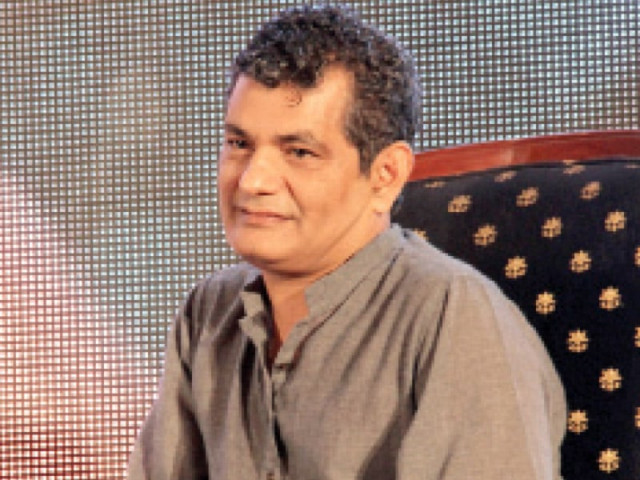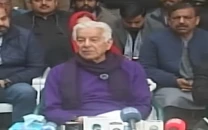Diagnosing a country: Pakistan's problem? Denialism, say speakers
Panel gathers at Habib University to discuss the malaise of our institutionalised denial

Hanif primarily concerned himself with the logic we provide ourselves to live with the denial. PHOTO: EXPRESS
One does not have to look very far for examples of this phenomenon - whether it's the 'masks' that Meera says people wore when they 'impersonated' her in a televised feed or the accursed green colour on the soles of our shoes that caused us great loss on the cricket pitch. A venerable collection of social commentators gathered at Habib University on Friday to discuss the admittedly sophisticated structure of our institutionalised denial.
Nazish Brohi, a researcher, began the panel discussion, titled 'Pakistani Denialism: State, Media and Society'. She spoke of the elements of Pakistan's emblem: the tea and wheat, which we do not produce; the wreath, which we did not inherit; the faith, unity and discipline, the former of which we have too much, the latter of which we do not have. Brohi put faith at the front and centre of our denialism.
"Pakistan was born dethroned," she said, making the argument that Muslims had lost whatever political power they had a couple of centuries before Pakistan's creation.
The grim facts piled up. Nauman Naqvi, the panel moderator and dean of Habib University, mentioned the falsehood of Pakistan's national days. Pakistan was not technically born on August 14; 'Pakistan' was not mentioned in the resolution passed on March 23; September 6 was a defeat disguised as victory.
In the circles of academics, journalists, and liberals gathered at the university, the long list of the government's past and present follies were known and talked about. It seemed unlikely that the denialists referred to were present. Still, the opportunity provided both the audience and the presenters some relief from the denialism prevalent outside Habib's hallowed halls and an opportunity to share their thoughts and experiences.
Wusatullah Khan, a columnist, said that for many, denialism is a good thing. He mentioned the slave trade, the Nazis, and our very own Islamising mission that began after Muhammad Bin Qasim arrived on South Asian shores. "Denialism is used as an instrument of justification," he said.
Khan deconstructed and described the process: Conspiracy theories, where we invent and employ stories with little basis in fact to explain, and sometimes reject, events. Cherry-picking, where we ignore the overwhelming evidence in front of us to pick and choose facts for the construction of the aforementioned conspiracy theory. Bad research, since the cherry-picked facts we use are not reliable. Intimidation, where, when people don't buy it, we force them to. "Kargil or '71, they're not defeats," Khan said. "They're tactical retreats."
Author Mohammed Hanif alluded to the 'feel good' element of denying that one does bad things. "You go to a doctor and he asks you how many cigarettes you smoke. You tell him five, even if you smoke a pack a day, and then the idea that you smoke less than you actually do already starts making you feel better."
But Hanif primarily concerned himself with the logic we provide ourselves to live with the denial. "We praise Bin Laden as a hero but then deny that he was responsible for 9/11. Why would he be a hero if he didn't do it?" Hanif asked, seemingly mystified by it all.
Of course, in these discussions, there's little in the way of prescriptions. Pakistan's bad habit seems set to continue. Brohi just recommended one change: "Perhaps we should change Pakistan's emblem to a water-kit."
Published in The Express Tribune, January 25th, 2015.
Correction: In an earlier version of the story, it was mistakenly stated that Nazish Brohi mentioned wheat and jute as the crops Pakistan doesn't produce.



















COMMENTS
Comments are moderated and generally will be posted if they are on-topic and not abusive.
For more information, please see our Comments FAQ